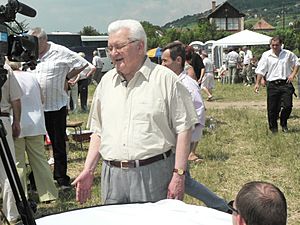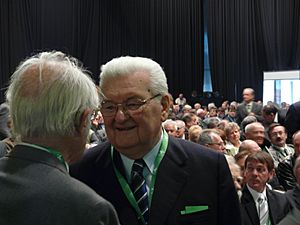Péter Boross facts for kids
Quick facts for kids
Péter Boross
|
|
|---|---|
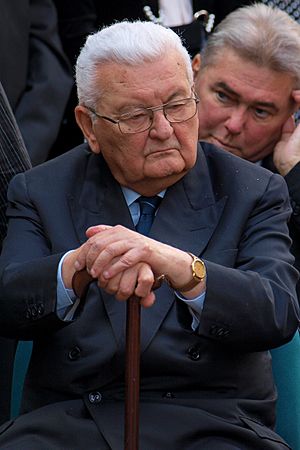
Boross in 2014
|
|
| Prime Minister of Hungary | |
| In office 12 December 1993 – 15 July 1994 Acting: 12 December 1993 – 21 December 1993 |
|
| President | Árpád Göncz |
| Preceded by | József Antall |
| Succeeded by | Gyula Horn |
| Minister of the Interior | |
| In office 21 December 1990 – 21 December 1993 |
|
| Prime Minister | József Antall Himself (acting) |
| Preceded by | Balázs Horváth |
| Succeeded by | Imre Kónya |
| Minister of Civilian Intelligence Services | |
| In office 19 July 1990 – 21 December 1990 |
|
| Prime Minister | József Antall |
| Preceded by | Position established |
| Succeeded by | András Gálszécsy |
| Member of the National Assembly | |
| In office 16 May 2006 – 31 January 2009 |
|
| In office 28 June 1994 – 17 June 1998 |
|
| Personal details | |
| Born | 27 August 1928 Nagybajom, Hungary |
| Political party | MDF (1992–2010) |
| Spouse |
Ilona Papp
(m. 1952; died 2010) |
| Children | 3 |
Péter Boross (born August 27, 1928) is a Hungarian politician who used to be the Prime Minister of Hungary. He served as prime minister from December 1993 to July 1994. He took over after the death of the previous prime minister, József Antall. His political group lost the next election to the Hungarian Socialist Party, led by Gyula Horn.
Before becoming prime minister, Boross was the Minister of Civilian Intelligence Services in 1990. He also served as the Minister of the Interior from 1990 to 1993. He was a Member of Parliament at different times, from 1994 to 1998 and from 2006 to 2009. At 96 years old, he is the longest-living prime minister in Hungary's history.
Contents
Early Life and Education (1928–1957)
Péter Boross was born in Nagybajom, Hungary, on August 27, 1928. His father, György Boross, was a forest engineer. His mother, Lujza Horváth, loved Hungarian literature. Péter had a younger brother named László.
He started military school in 1938. During Second World War, his school moved to Germany. Boross managed to escape and return to Hungary. He finished high school in 1947.
Boross studied law at Eötvös Loránd University and became a lawyer in 1951. He then worked for the city council in Budapest.
Role in the 1956 Revolution
During the Hungarian Revolution of 1956, Boross was part of a revolutionary committee in Budapest. After the revolution was stopped, he lost his job in January 1957. He then worked as an unskilled worker. In July 1957, he was arrested for his role in the revolution. He was held in a camp for a short time before being released. His family was watched by the police until 1959.
Career in Catering (1957–1989)
After his release, Boross started working in the catering industry in October 1957. He was first an inspector, then a bartender. He became an assistant manager in 1958 and a manager in 1961.
In 1965, he was promoted to Deputy Director of the South-Pest Catering Company. This company managed many restaurants and food businesses. In 1971, Boross became the Director of the company. He retired from this job in 1989.
Political Career (1990–2010)
Government Roles (1990–1993)
Péter Boross had a long friendship with József Antall. After the 1990 election, when the Hungarian Democratic Forum (MDF) won, Prime Minister Antall asked Boross to join his government.
Boross became the Political Secretary of State in May 1990. Soon after, in July 1990, he was made Minister without portfolio for Civilian Intelligence Services. In this role, he oversaw Hungary's intelligence agencies. One of his first tasks was to remove former communist secret service leaders.
In December 1990, Boross became the Minister of the Interior. This made him the second-highest-ranking member of the government. As minister, he reorganized the police force. He also worked on laws for local governments.
Boross officially joined the MDF party in August 1992. By early 1993, he became one of the party's vice-presidents. When Prime Minister Antall became very ill, Boross temporarily took over his duties. Antall passed away on December 12, 1993.
Becoming Prime Minister (1993–1994)
After József Antall's death, Péter Boross became the acting prime minister on December 12, 1993. The MDF party then chose him as their candidate for prime minister. On December 21, 1993, the Hungarian Parliament elected Boross as prime minister.
His government mostly kept the same ministers as Antall's. Because of this, people often called it the "Antall–Boross cabinet."
As prime minister, Boross met with leaders from other Central European countries. He also visited leaders in France and Germany to discuss international relations.
In the 1994 parliamentary election, Boross's party was defeated. Gyula Horn and his Socialist Party won a large victory. Horn became the new Prime Minister of Hungary in July 1994.
After His Premiership (1994–2010)
After the 1994 election, the MDF party lost many seats. Boross was still elected as a Member of Parliament. He became the Chairman of the National Security Committee.
He supported Sándor Lezsák in a party leadership election. When Lezsák became party president, some members left the MDF. Boross remained with the party. He lost his parliamentary seat in the 1998 election.
Boross later became a political advisor to Prime Minister Viktor Orbán. However, his relationship with Orbán became difficult by 2001. He also disagreed with some of the government's economic policies.
In 2006, Boross was again elected as a Member of Parliament. He became a member of the National Security Committee. He disagreed with the MDF party's direction under its leader, Ibolya Dávid. As a result, Boross resigned from parliament in January 2009. He completely left the MDF party in January 2010.
Later Life (Since 2010)
After the 2010 election, Péter Boross became an advisor to Prime Minister Viktor Orbán. He helped with ideas for Hungary's new constitution.
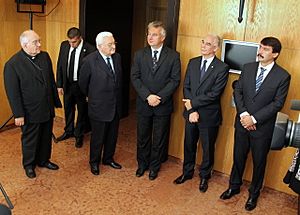
In 2010, Boross gave an interview where he suggested a "childlessness tax." This idea caused some groups to protest against his comments.
In 2015, during the European migrant crisis, Boross made comments about immigration. He supported building a fence on the Hungarian border. He also said that comparing the current situation to Hungarian refugees in 1956 was not appropriate. An authority investigated his remarks but found no violation.
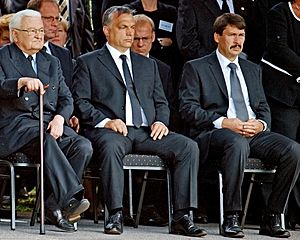
In 2016, Boross gave a speech for the 60th anniversary of the 1956 revolution. He criticized statements from the United States about media freedom in Hungary.
Personal Life
Péter Boross married Ilona Papp in 1952. She was a judge. They had three children. Their first child, Péter Jr., passed away as a baby in 1958. They then had a daughter, Ildikó, who became a lawyer, and a son, Gábor, who passed away in 2018. Ilona Papp, Boross's wife, passed away in 2010.
See also
 In Spanish: Péter Boross para niños
In Spanish: Péter Boross para niños
 | Toni Morrison |
 | Barack Obama |
 | Martin Luther King Jr. |
 | Ralph Bunche |


